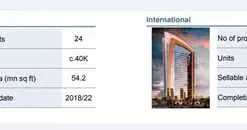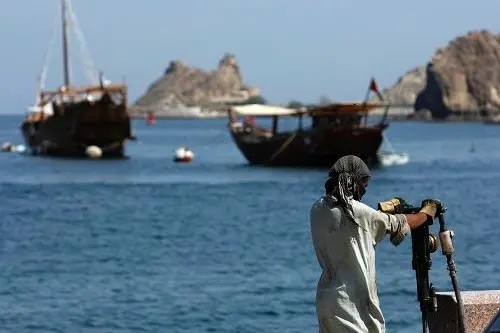PHOTO
Dubai-based Damac Properties has gained approval for its masterplan to redevelop Port Sultan Qaboos in Muscat and is looking to move ahead with its first phase, according to a leading executive in its international arm.
Speaking to Zawya at the Cityscape Global conference in Dubai on Tuesday, the company's senior vice-president for international business development, Wael al-Lawati, said: "We've presented our masterplan to the government, and it's recently been approved. We're very excited.
"It's a $2 billion regeneration project. I'm not aware of anything of this size where one million square metres of industrial land is being converted into a mixed-use community," he said.
"It's the first regeneration project we do and it's the first in Oman," Al-Lawati said.
Damac Properties signed an agreement with the Government of Oman in June 2017 to redevelop the site of Port Sultan Qaboos alongside the sultanate's state-owned development company, Omran.
Port Sultan Qaboos was the main commercial port serving Oman's capital city, Muscat, until the opening of the new Sohar Port and Freezone in the early part of this decade. Since then, the port has mainly been used as a stopping point for cruise vessels, but Al-Lawati said it still hosts some other facilities such as a bitumen plant and grain silos that need to be relocated or repurposed.
"Certain usages will continue, others have to move out. Some stakeholders are not required any more, like quarantine. The Navy is moving to a new naval base and the coast guard will downsize their operations," he said.
Other facilities need to be upgraded, such as customs, because of the higher number of anticipated cruise passengers once upgrade works complete. Al-Lawati said the aim is to transform the port from a stopping point for cruise liners to a base. The port is also home to the city's historic Muttrah souq, and Al-Lawati said that part of the redevelopment involves using retail and other elements to create a "seamless approach" into the port's historic environs.
"It's not about creating a new project that kills the old town. It's about augmenting the port and providing a beautiful launchpad. So people come in, they see the mountainside, they go to the fish market, then they go to the bazaar, they go to Muscat and they come back.
He anticipates a "three-year window" for the first phase of the project, "and then we'll have other phases happening in tandem, depending on sales velocities and uptake and so on".
He declined to give a date for when the first phase would start, other than stating it would be "very soon".
In terms of its operations in other Gulf countries (outside of its home market in the United Arab Emirates), Al-Lawati said it was continuing to build out two towers in Qatar, but said the country was "not really our focus at the moment".
"There's so much growth happening and with the issues that Qatar are facing it's obviously not the place where we want to focus our attention."
Saudi in vision
Saudi Arabia, on the other hand, is a country where it is keen to do more. The company opened its first tower in Saudi Arabia, Al Jawharah, in 2014 and is now beginning to handover units in a pair of towers in Riyadh, Damac Esclusiva and Paramount.
Al-Lawati said that it was talking to the government and private investors about further developments in the kingdom.
"We're very keen on the Saudi market. It continues to be a big buyer base for us. With the economic reforms and the opening of the country, the focus on entertainment, it would be daft for us not to be looking at that market," he said.
Further afield, Al-Lawati said that Damac Tower Nine Elms in London is about 30 percent complete and is on track to complete in 2020.
"Multiplex is the contractor and they're doing a fabulous job. You have to pick the best for something that iconic, that complicated on the river. And London's not a place you get away with anything. We know we can do a good job and we will."
The market for prime London property has been gradually softening since the end of 2015, according a survey by United Kingdom private bank Coutts, and although prices of £1 million-plus ($1.3 million-plus) are just 1.7 percent lower than a year ago, the volume of transactions completed in this price bracket have dropped by 16.9 percent.
Al-Lawati said although the market is softer, with concerns about Britain's forthcoming withdrawal from the European Union, for "opportunistic investors" there are deals to be done.
"What do the Chinese say? With every crisis comes an opportunity," he said.
American dream
Damac's chairman, Hussain Sajwani, has also previously expressed a desire to develop in key "gateway cities" in the United States. Al-Lawati said this was still something of interest, but there were a number of challenges - not least finding suitable sites.
"The cost of doing business there, the distance, the tax base, it poses its own challenges. But we're constantly scouting. We have people who are looking, the chairman is there every few months.
"It's still on our radar, but we're not under pressure to do anything. It's all about the if it's right deal at the right time and the right price. It's not a mandate where we have to be in this city by such and such a time."
On Tuesday, it was also announced that Sajwani, through an investment vehicle known as DICO International, had signed a global partnership with Italian fashion house Roberto Cavalli Group to develop a chain of Cavalli-designed hotels.
The first of these will be built in Dubai's Media City district, opposite the Westin Mina Siyahi hotel, Damac's senior vice-president Niall McLoughlin told Zawya.
The 220-room hotel will be housed in a 55-storey tower that will also contain apartments. Work on the tower's foundations are already underway, and main contract works will start in January.
McLoughlin explained that the hotel and some apartments will be retained by DICO international, but that Damac Properties would service the project and handle sales, where required.
He also added that the Dubai hotel would be the first of a series of Cavalli-branded hotels in cities worldwide. "We have a few target cities," McLoughlin said, but declined to which ones. "Roberto Cavalli has some target cities that they are interested in," he added. "It has to be the right plot. So we'll be looking at redevelopment opportunities in established cities or some virgin sites in some up-and-coming, emerging cities. We've been working on this for quite a while to get it right.”
Damac Properties' international arm remains a relatively small part of the company's overall operations, with a document provided for investors explaining its Q2 results to the end of June stating that it comprises about 1,000 units under development in five projects with a sellable area of 1.3 million square feet. By comparison, the company is currently developing 24 projects containing around 40,000 units in the UAE, with a sellable area of 54.2 million sq ft.
Accounts for the six months to June 30 show Damac's international arm has development properties worth 1.48 billion dirhams, compared to 7.7 billion dirhams worth of UAE properties.


Breakdown of Damac Properties’ domestic and international portfolios
Source: Damac Properties Q2 2018 investor presentation
(Reporting by Michael Fahy; Editing by Shane McGinley)
Our Standards: The Thomson Reuters Trust Principles
Disclaimer: This article is provided for informational purposes only. The content does not provide tax, legal or investment advice or opinion regarding the suitability, value or profitability of any particular security, portfolio or investment strategy. Read our full disclaimer policy here.
© ZAWYA 2018




















